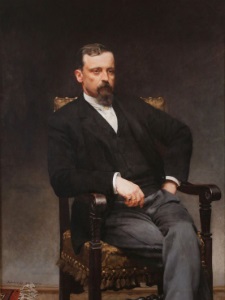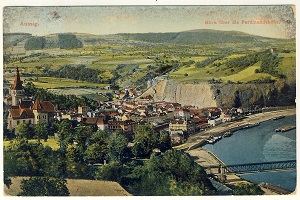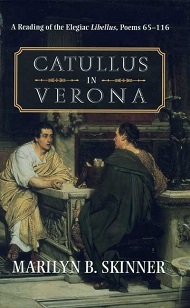De Poolse schrijver en journalist Henryk Sienkiewicz werd geboren in Wola Okrzejska op 5 mei 1846. Zie ook alle tags voor Henryk Sienkiewicz op dit blog.
Uit: Quo vadis? (Vertaald door Jeremiah Curtin)
“Besides Asklepios, I have had dealings with sons of Asklepios. When I was troubled a little last year in the bladder, they performed an incubation for me. I saw that they were tricksters, but I said to myself: ‘What harm! The world stands on deceit, and life is an illusion. The soul is an illusion too. But one must have reason enough to distinguish pleasant from painful illusions.’ I shall give command to burn in my hypocaustum, cedar-wood sprinkled with ambergris, for during life I prefer perfumes to stenches. As to Kypris, to whom thou hast also confided me, I have known her guardianship to the extent that I have twinges in my right foot. But as to the rest she is a good goddess! I suppose that thou wilt bear sooner or later white doves to her altar.”
“True,” answered Vinicius. “The arrows of the Parthians have not reached my body, but a dart of Amor has struck me—unexpectedly, a few stadia from a gate of this city.”
“By the white knees of the Graces! thou wilt tell me of this at a leisure hour.”
“I have come purposely to get thy advice,” answered Marcus.
But at that moment the epilatores came, and occupied themselves with Petronius. Marcus, throwing aside his tunic, entered a bath of tepid water, for Petronius invited him to a plunge bath.
“Ah, I have not even asked whether thy feeling is reciprocated,” said Petronius, looking at the youthful body of Marcus, which was as if cut out of marble. “Had Lysippos seen thee, thou wouldst be ornamenting now the gate leading to the Palatine, as a statue of Hercules in youth.”
The young man smiled with satisfaction, and began to sink in the bath, splashing warm water abundantly on the mosaic which represented Hera at the moment when she was imploring Sleep to lull Zeus to rest. Petronius looked at him with the satisfied eye of an artist.
When Vinicius had finished and yielded himself in turn to the epilatores, a lector came in with a bronze tube at his breast and rolls of paper in the tube.
“Dost wish to listen?” asked Petronius.
“If it is thy creation, gladly!” answered the young tribune; “if not, I prefer conversation. Poets seize people at present on every street corner.”

Henryk Sienkiewicz (5 mei 1846 – 15 november 1916)
Portret door Kazimierz Pochwalski, 1890
De Engelse dichter Richard Watson Dixon werd geboren in Islington op 5 mei 1833. Zie ook alle tags voor Richard Watson Dixon op dit blog.
Too Much Friendship. The Story Of Septimius And Alcander (Fragment)
When Athens, fallen beneath the Roman sway,
Kept still the relics of her bygone day,
The youth who most adorned her sacred hill
Was named Alcander: by Apollo’s will
Votive to those high arts the god has given
To penetrate the ways of earth and heaven :
To whom no less the blind wheel-goddess spared
Her largess lavish ; so that few compared
In happiness with him, and one alone
His rival in men”’s expectation shone,
This was Septimius, who, of Roman name.
To Athens o”er the Tyrrhene waters came,
And held in rhetoric renown as high
As the other equalled in philosophy.
Nor lacked there kindliness between the two
From first, which into closest friendship grew.
The god of arts from their arts different
Inspired them peace, and benediction sent :
And in his sphere, the intellectual sky
Bade his satellites move in harmony.
Long lingered they in youth’s fair indolence,
And still would he that noble calm dispense
Which “’tis the due of youth from life to gain
Before dark Care begin her iron reign,
And break the prime : but ah ! there came at length
The breaking time : when youth his fiery strength
To match against the awaiting world is moved.
In life’s wide lists desirous to be proved.

Richard Watson Dixon (5 mei 1833 – 23 januari 1900)
Cover
De Tsjechische (Duitstalige) dichter en schrijver Hans Werner Kolben werd geboren op 5 Mei 1922 in Aussig an der Elbe. Zie ook alle tags voor Hans Werner Kolben op dit blog.
Hunger
Und so werden die vor dem Hungertod,
Wenn sie Lächeln und Mienen verloren haben
Und wie schreiende Vögel in Müllhaufen graben,
Nach faulenden Früchten und staubigem Brot.
Und einer, der dort in die Gasse getreten,
Dessen Herz noch in letzten Umhüllungen war,
Und von ihnen umschwirrt, um Almosen gebeten,
Und sie brachten ihm gänzlich ihr Innerstes dar,
So also ob man ihm Spiegel entgegenrecke,
Aus denen sein künftiges Angesicht sprach;
Wie verbarg er sein Haupt und floh um die Ecke,
Doch es half ihm wohl nichts, denn die Zeit lief ihm nach.

Hans Werner Kolben (5 mei 1922 – 23 maart 1945)
Aussig an der Elbe (nu: Ústí nad Labem in Tsjechië) op een ansichtkaart uit 1912
De Duitse dichter Christian Friedrich Scherenberg werd geboren op 5 mei 1798 in Stettin. Zie ookalle tags voor Christian Friedrich Scherenberg op dit blog.
Fischers Heimbucht
Stille, Stille über mir, –
Stille um mich her, –
Noch ein Tröpfchen
Fällt vom matten Ruder
Leise, schläfrig in das Meer. –
Alles – müde,
Mann und Zeug –
Bin auch müde –
Herzlich müde! –
Nun, so buchte,
Alter Nachen
Uns nur sachte
In die Ruhe ein! –

Christian Friedrich Scherenberg (5 mei 1798 – 9 september 1881)
Theodor Fontane bracht hulde aan de dichter door een deel van zijn memoires in 1884 te publiceren onder de titel “Christian Friedrich Scherenberg und das literarische Berlin von 1840 bis 1860”.
Onafhankelijk van geboortedata:
De Romeinse dichter Gaius Valerius Catullus werd geboren in 87 v. Chr, in Sirmione bij Verona Zie ook alle tags voor Catullus op dit blog.
Carmina
II
Sijsje, waar mijn meisje graag mee speelt,
dat zij aan haar borst drukt, dat zij streelt,
dat zij driftig in haar pink laat pikken,
als zij troost zoekt in de oogenblikken,
dat het hartje van mijn lieveling
harder klopt, alsof het barsten ging,
tot ontspanning van ’t geprangd gemoed
en verkoeling van den fellen gloed,
mocht ik als je zoete lieve vrouw
vrede vinden in een spel met jou!
IX
Veranius, die al mijn goede vrienden
tot in ´t oneindige te bovengaat,
ben je weer thuis in den familiekring,
thuis bij je broers, thuis bij je oude moeder?
Ja, ja je bent er. Wat een heuglijk nieuws!
Behouden zal ´k je weerzien, je verhalen
van Spanjes volk, gebruik en landschap hooren.
Ik hoor je al en ik omhels je al.
Je lieven mond en oogen kus ik al.
O menschenwereld, door geluk verwend,
blijder dan ik kan niets zijn wat gij kent.
Vertaald door A. Rutgers van der Loeff

Catullus (87 v. Chr – 54 v. Chr.)
Cover van een boek over de gedichten van Catullus
